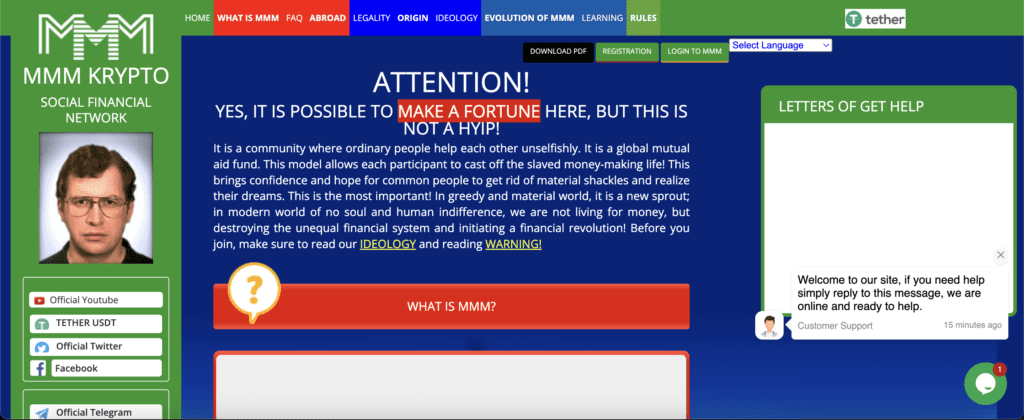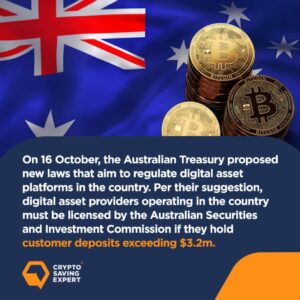- The resurgence of MMM, now under the moniker MMM Krypto, has prompted the FSCA in South Africa to issue a warning about the scheme’s alluring promises of unrealistic returns, ranging from 24% to 36% per month.
- Operating in numerous African countries, including South Africa, Ghana, Nigeria, Kenya, and Zimbabwe, MMM Global has a history of controversy and legal scrutiny.
- As with its predecessor, MMM Global, the rebranded MMM Krypto will likely resurface across much of Africa.
In the intricate history of Ponzi schemes, none has left a more extensive mark than MMM Global, a notorious financial scheme operated in 110 countries. Originating as a reincarnation of a 1990s Ponzi scheme from Russia, MMM Global has resurfaced with a fresh guise – MMM Krypto. However, the reappearance of this giant Ponzi scheme has raised red flags, particularly in South Africa, where the Financial Sector Conduct Authority (FSCA) has issued a stern warning to the public regarding MMM Krypto’s enticing yet unrealistic promises of returns ranging from 24% to 36% per month.
MMM Krypto’s Roots and Controversial Past
MMM Krypto is not a new player in the financial scheme arena; it’s essentially a rebrand of MMM Global, a scheme that gained infamy as one of the most significant Ponzi schemes of the 2010s. MMM Global proudly declared itself as a Global Mutual Aid Fund, World People’s Bank, and Financial Social Network, emphasizing its voluntary association against financial enslavement. Operating in numerous African countries, including South Africa, Ghana, Nigeria, Kenya, and Zimbabwe, MMM Global has a history of controversy and legal scrutiny.
Operational Model and Historical Incidents
MMM Global in South Africa
MMM Global’s operational model entailed promising participants a 30% monthly return, a pledge that enticed individuals across continents. In 2015, South Africa witnessed MMM’s entry, accompanied by the grand claim of a lucrative 30% monthly return. The National Consumer Commission identified the scheme as a potential pyramid scheme, leading to Capitec Bank freezing accounts. Despite investigations and criticism, MMM resumed operations in late 2016.
It promised participants exceptionally high monthly returns, relying on a classic pyramid structure. Participants were recruited to make financial contributions, and returns were paid from the funds of new members rather than actual profits. The scheme collapsed when recruitment slowed, causing significant economic losses for participants. MMM Global’s model involved a referral system, no real investments or profits, and subsequent attempts at rebranding. The scheme faced legal issues and warnings from regulatory authorities worldwide.
MMM Global in Nigeria
In Nigeria (2015-2017), MMM launched with similar promises, targeting the unemployed and amassing 2.4 million participants by late 2016. However, in December 2016, accounts were frozen, causing panic, attempted suicides, and official warnings. Though reopening in January 2017, MMM Nigeria grappled with ongoing participant grievances and scepticism.
MMM Global in Zimbabwe
Zimbabwe (2015-2016) also experienced the impact of MMM, offering a 30% monthly return. The Reserve Bank’s warning triggered the freezing of accounts in September 2016, causing economic instability. Upon unfreezing, participants faced an 80% loss penalty for withdrawals, affecting 66,000 individuals.
MMM Global in China
China (2013-2016) saw the rise and fall of MMM, ultimately leading to a ban by the Chinese government in January 2016 due to its identification as a pyramid scheme.
MMM Global in Ghana
In Ghana (2016), MMM extended its reach to West Africa, marking its entry into the Ghanaian financial landscape.
MMM Global in Kenya
Kenya (2016-2017) encountered MMM in October 2016, offering a tempting 30% monthly interest rate. Concerns about a recurrence of 2007 financial losses led to warnings from the Central Bank in December 2016 and April 2017.
MMM Global in Brazil
Brazil (2015) witnessed MMM’s establishment, enticing participants with a lofty 50% monthly interest rate.
MMM Global in other countries
The scheme also operated in other countries until 2016, including India, Thailand, Philippines, Japan, Australia, Turkey, and Indonesia.
MMM’s Rebranding as Krypto and Current Concerns
The resurgence of MMM, now under the moniker MMM Krypto, has prompted the FSCA in South Africa to issue a warning about the scheme’s alluring promises of unrealistic returns, ranging from 24% to 36% per month. MMM Krypto’s operational model involves claiming to provide “help” as a loan, operating as a peer-to-peer lending bank. The scheme utilizes a referral system and social media to attract individuals, coupling these strategies with promises of substantial monthly returns.
The SA FSCA’s concerns revolve around the unrealistic returns MMM Krypto offers to the South African public. Emphasizing the need for authorization by the FSCA to provide financial products or services in South Africa, the regulatory body points out that MMM Krypto needs the necessary license for its operations.
MMM Founders and Legal Troubles
Founded in Russia in 1989 by Sergei and Vyacheslav Mavrodi and Olga Melnikova, MMM Krypto shares its origins with MMM Global. Sergei Mavrodi, who achieved political prominence by being elected to the Russian Duma in 1994, faced legal troubles, including a conviction for fraud in 2007. His demise occurred in 2018.
MMM Krypto’s recent event in Durban, South Africa, where it enticed investors with claims of making returns of 30% a month, has raised further concerns. The FSCA has referred MMM Krypto to the National Consumer Commission for additional investigation.
Warning Signs and Regulatory Advice
All could be better on the MMM Krypto front, and various warning signs on its website (screenshot below, though we have chosen not to include links) align with common characteristics associated with cryptocurrency scams. These include sloppy graphic design, lack of site security, and the utilization of USDT in transfers, which raises additional concerns.


In response to MMM Krypto’s potential risks, the SA FSCA advises the public to verify whether entities providing financial products and services are licensed. Individuals are encouraged to scrutinize the advice a license authorizes the financial services provider to offer. Caution and due diligence are essential when dealing with financial schemes, particularly those making enticing promises.
The Unfolding Scenario and the Future of MMM Krypto
As with its predecessor, MMM Global, the rebranded MMM Krypto will likely resurface across much of Africa. The allure of fast money in challenging economic times remains potent, and the lack of regulation in the cryptocurrency space makes it easier for operators to present it as a forbidden fruit. The cycle of enticing promises, financial instability, and subsequent rebranding appears to persist.
While critics continue to highlight the inherent unreliability of Ponzi schemes, predicting their inevitable failure, some participants still view MMM – in all its iterations – as a gamble or a form of mutual aid with no guarantees. The saga of MMM, now reincarnated as MMM Krypto unfolds against the backdrop of historical controversies, legal troubles, and the perpetual tug-of-war between regulatory bodies and financial schemes that exploit the vulnerabilities of unsuspecting individuals. As the MMM story evolves, one can only anticipate further chapters in the complex narrative of financial schemes and their enduring impact on global economies.
- SEO Powered Content & PR Distribution. Get Amplified Today.
- PlatoData.Network Vertical Generative Ai. Empower Yourself. Access Here.
- PlatoAiStream. Web3 Intelligence. Knowledge Amplified. Access Here.
- PlatoESG. Carbon, CleanTech, Energy, Environment, Solar, Waste Management. Access Here.
- PlatoHealth. Biotech and Clinical Trials Intelligence. Access Here.
- Source: https://web3africa.news/2024/01/29/news/mmm-ponzi-scheme-back-mmm-krypto/
- :has
- :is
- :not
- :where
- 000
- 1994
- 2015
- 2016
- 2017
- 2018
- 420
- 66
- a
- About
- accompanied
- Accounts
- achieved
- across
- actual
- Additional
- advice
- affecting
- africa
- African
- against
- Aid
- align
- All
- allure
- also
- Amassing
- an
- and
- anticipate
- appears
- April
- ARE
- Arena
- around
- AS
- associated
- Association
- At
- attempted
- Attempts
- attract
- Australia
- Authorities
- authority
- authorization
- backdrop
- Ban
- Bank
- BE
- being
- below
- Better
- between
- bodies
- body
- by
- CAN
- causing
- caution
- central
- Central Bank
- challenging
- chapters
- characteristics
- chinese
- chosen
- claim
- claiming
- claims
- classic
- CO
- collapsed
- commission
- complex
- Concerns
- Conduct
- consumer
- continue
- contributions
- controversial
- controversy
- conviction
- could
- countries
- criticism
- Critics
- cryptocurrency
- Current
- cycle
- dealing
- December
- declared
- Design
- Despite
- diligence
- due
- Duma
- easier
- Economic
- economies
- elected
- emphasizing
- encouraged
- enduring
- enticing
- entities
- entry
- essential
- essentially
- establishment
- Event
- evolves
- exceptionally
- experienced
- Exploit
- extended
- extensive
- faced
- Failure
- Fall
- FAST
- financial
- financial products
- financial services
- financial services provider
- flags
- For
- form
- founders
- fraud
- Freezing
- fresh
- from
- front
- frozen
- fund
- funds
- further
- future
- gained
- Gamble
- Ghana
- giant
- Global
- Government
- grand
- Graphic
- guarantees
- guise
- Have
- High
- Highlight
- his
- historical
- history
- However
- HTTPS
- Identification
- identified
- Impact
- in
- In other
- include
- Including
- india
- individuals
- Indonesia
- inevitable
- inherent
- instability
- interest
- INTEREST RATE
- into
- intricate
- investigation
- Investigations
- Investments
- Investors
- involved
- involves
- issue
- Issued
- issues
- IT
- iterations
- ITS
- itself
- January
- Japan
- kenya
- Krypto
- Lack
- lack of regulation
- landscape
- Late
- launched
- leading
- Led
- left
- Legal
- Legal issues
- lending
- License
- Licensed
- likely
- loan
- lofty
- loss
- losses
- lucrative
- make
- MAKES
- Making
- mark
- marking
- max-width
- Media
- Members
- million
- model
- money
- Month
- monthly
- more
- most
- much
- mutual
- NARRATIVE
- National
- necessary
- Need
- needs
- network
- New
- news
- Nigeria
- no
- None
- notorious
- now
- numerous
- occurred
- october
- of
- offer
- offering
- Offers
- official
- on
- ONE
- ongoing
- only
- operated
- operating
- operational
- Operations
- operators
- or
- originating
- origins
- Other
- out
- paid
- Panic
- participant
- participants
- particularly
- peer to peer
- peer-to-peer lending
- people’s
- per
- Perpetual
- Philippines
- plato
- Plato Data Intelligence
- PlatoData
- player
- Pledge
- points
- political
- ponzi
- Ponzi Scheme
- Ponzi Schemes
- potent
- potential
- predecessor
- predicting
- present
- Products
- profits
- prominence
- promised
- promises
- promising
- proudly
- provide
- provider
- providing
- public
- Pyramid
- Pyramid Scheme
- raised
- raises
- ranging
- Rate
- rather
- reach
- real
- Rebrand
- rebranded
- rebranding
- recent
- recruitment
- recurrence
- Red
- Red Flags
- Redux
- Referral
- referred
- regarding
- Regulation
- regulatory
- relying
- remains
- Reserve
- response
- return
- returns
- Rise
- risks
- roots
- Russia
- russian
- SA
- saga
- saw
- Scam
- scenario
- scheme
- schemes
- scrutiny
- sector
- security
- September
- Services
- Shares
- significant
- Signs
- similar
- site
- Social
- social media
- social network
- some
- South
- South Africa
- South African
- Space
- Still
- Story
- strategies
- structure
- subsequent
- substantial
- system
- targeting
- Thailand
- than
- that
- The
- The Future
- their
- These
- this
- those
- though?
- times
- to
- transfers
- triggered
- true
- Turkey
- Ultimately
- under
- unfolding
- until
- upon
- USDT
- utilizes
- various
- verify
- View
- voluntary
- Vulnerabilities
- warning
- we
- Web3africa
- Website
- were
- West
- west africa
- when
- whether
- which
- WHO
- will
- with
- Withdrawals
- witnessed
- world
- worldwide
- yet
- zephyrnet
- Zimbabwe













